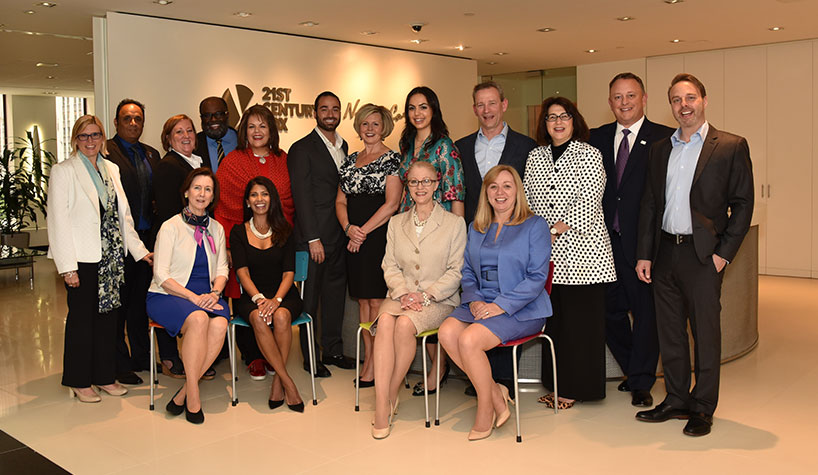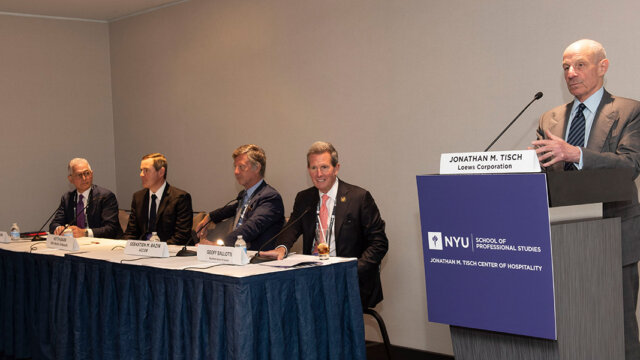NEW YORK—Everyone involved in this industry knows that it’s changed. Today’s guests want local, authentic, personalized service and design, and they want it in a tech-enabled way. The industry has risen to the occasion, creating spaces and brands that meet the needs of travelers—but there’s another shift that the industry has been adapting to as well: a culture shift behind the scenes.
Last week, Hotel Business held an executive roundtable, “Culture Shift: Working in 2018 and Beyond,” hosted and sponsored by The Wall Street Journal, which explored the ways in which the hospitality workforce—and its leadership—is changing. Topics explored included the evolving demographics of the industry, including racial and ethnic diversity, elevating women and the newer generations entering or molding the workplace: Gen Y and Gen Z. Panelists discussed not only the macro trends around these changes, but action-oriented steps their organizations are taking to meet the needs of today’s workforce.
Andy Ingraham, president/CEO, National Association of Black Hotel Owners Operators & Developers (NABHOOD), noted that his organization is focused on cultivating that second generation of African-American leaders. “In 2001, there was one African-American-owned branded hotel in the United States. Today, we’re just short of 825 hotels,” he said, adding that one of the challenges the industry faces is that, for many years, many African-Americans haven’t wanted to go into the hospitality industry because they didn’t see a career path forward.
The key, he said, is access to opportunity. “It’s having the leadership of traditional organizations say we want to give you access, opportunity and want to be part of the change. That’s our continuous model to look for those forward-thinking executives,” Ingraham said, noting that every year, NABHOOD brings in about 50 students from around the country for its owners to mentor.
Access, of course, is important for women as well. Fran Kiradjian, founder/CEO, Boutique & Lifestyle Leaders Association (BLLA), noted that at her organization’s conferences—it held its latest, the Boutique Hotel Investment Conference, last week—at least 50% of the speakers have to be women. “We’re walking the talk at our conferences… that’s a culture shift through the hospitality industry.”
Ariela Kiradjian, COO, BLLA & co-founder, Stay Boutique, added, “It can’t just be a female-empowerment conference.” While those are great, she said, women’s voices must also be in the mix discussing diverse topics.
And, of course, the panelists dove into younger workers in the industry and how their companies are appealing to them. Dianna Vaughan, global head and SVP, All Suites brands by Hilton, pointed to the brand company’s Travel With Purpose platform. “It really connects with millennials… We have one week a year where we volunteer in our local communities, and every hotel or corporate office can do some sort of activity,” she said. “Just this year, we had over 4,000 projects, so that’s a really good way to enforce the culture.”
But, she added, it’s had additional benefits for the company’s employees. “What we found out is everyone wants to give back. It’s not just the millennials interested in giving back to the community,” Vaughan said.
Other panelists included Jagruti Panwala, AAHOA vice chairwoman & president/CEO Wealth Protection Strategies; Ann Fastiggi, managing director, head of hospitality leisure practice, RSR Partners; Ken Barrett, CEO/management division, White Lodging; Sunny Tolani, CEO, Prince Organization; Chris Green, COO, Chesapeake Hospitality; Brooke Denihan Barrett, CEO Denihan Hospitality; Justin Jabara, VP of development, Meyer Jabara Hotels; Donna Quadri-Felitti, Marvin Ashner director and associate professor at The Pennsylvania State University School of Hospitality Management; and Debra Punke, SVP of human capital and communications, Concord Hospitality.
For a deeper dive into these complex topics, look for the cover story in the July 15 issue of Hotel Business.


